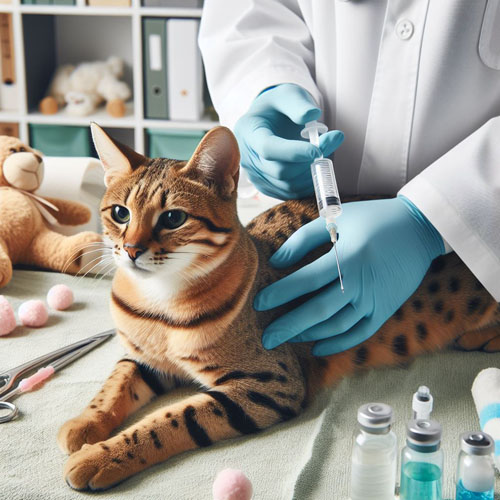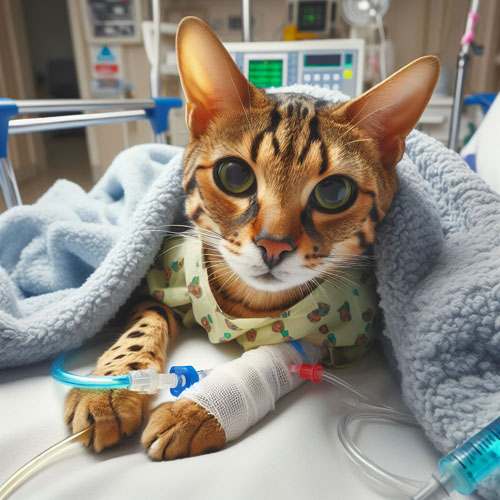Tritrichomonas Foetus in Savannah Cats
Unraveling Tritrichomonas Foetus in Savannah Cats: Symptoms, Diagnosis, and Treatment
Savannah cats, cherished for their distinctive appearance and playful nature, can face various health challenges. One such concern is Tritrichomonas foetus, a microscopic parasite that can cause gastrointestinal issues in felines. In this article, we will explore the symptoms, diagnosis, and treatment options for Tritrichomonas foetus in Savannah cats, offering valuable insights for cat owners.
Understanding Tritrichomonas Foetus: Tritrichomonas foetus is a single-celled protozoan parasite that primarily affects the large intestine of cats. While it can infect cats of any breed, Savannah cats are not exempt from this parasitic challenge. Transmission occurs through the ingestion of contaminated feces, making it particularly concerning for multi-cat households or environments with shared litter boxes.
Symptoms of Tritrichomonas Foetus in Savannah Cats: Identifying the symptoms of Tritrichomonas foetus is crucial for early intervention. Common signs associated with this parasitic infection in Savannah cats include:
- Chronic Diarrhea: Tritrichomonas foetus is notorious for causing persistent and often foul-smelling diarrhea in affected cats. The diarrhea may be intermittent, leading to a chronic condition that can significantly impact the cat’s overall health.
- Weight Loss: Chronic diarrhea can result in weight loss, as the cat may struggle to absorb essential nutrients from their food. Owners may notice a gradual decline in their Savannah cat’s body condition.
- Increased Defecation Frequency: Cats with Tritrichomonas foetus may exhibit more frequent bowel movements than usual. This, coupled with diarrhea, can be a telltale sign of the parasitic infection.
- Rectal Irritation: The constant passage of loose stools can lead to rectal irritation and discomfort. Cats may display signs of discomfort, such as excessive licking or scooting.
- Blood in Stool: In severe cases, blood may be present in the cat’s stool. This is a concerning symptom that warrants immediate veterinary attention.
Diagnosis of Tritrichomonas Foetus: Diagnosing Tritrichomonas foetus requires specialized testing, as traditional fecal examinations may not detect the parasite. Veterinary professionals may use the following methods for an accurate diagnosis:
- Fecal Culture: A fecal culture specifically designed for Tritrichomonas foetus is the most reliable diagnostic tool. This method involves incubating a fecal sample to allow the parasites to multiply, making them easier to detect under a microscope.
- Polymerase Chain Reaction (PCR) Testing: PCR testing amplifies the DNA of Tritrichomonas foetus, providing a highly sensitive and specific method for diagnosis. This is often used in conjunction with fecal cultures for confirmation.
Treatment Options for Tritrichomonas Foetus: Once diagnosed, treating Tritrichomonas foetus involves a multifaceted approach to eliminate the parasite and manage symptoms. Common treatment options include:
- Ronidazole: Ronidazole is an antiprotozoal medication that is often prescribed to eliminate Tritrichomonas foetus. It’s crucial to follow the prescribed dosage and duration to ensure effective treatment.
- High Fiber Diet: In addressing Tritrichomonas foetus in Savannah cats, incorporating high-fiber cat food can be beneficial. High-fiber diets can assist in managing gastrointestinal symptoms associated with the parasitic infection, aiding in the overall well-being of the affected feline. Consultation with a veterinarian to determine an appropriate dietary plan, including the incorporation of high-fiber cat food, is crucial in the comprehensive approach to managing Tritrichomonas foetus in Savannah cats.
- Supportive Care: Managing symptoms is essential for the overall well-being of the cat. This may involve providing an easily digestible diet, ensuring proper hydration, and addressing any secondary issues such as bacterial overgrowth.
- Environmental Management: Minimizing the spread of Tritrichomonas foetus within a multi-cat household involves maintaining good litter box hygiene. Regular cleaning and disinfection of litter boxes can help prevent reinfection.
- Regular Veterinary Monitoring: Cats undergoing treatment for Tritrichomonas foetus should be regularly monitored by a veterinarian. Follow-up testing may be necessary to confirm the effectiveness of the treatment.
Preventing Tritrichomonas Foetus: Prevention plays a crucial role in managing Tritrichomonas foetus in Savannah cats. Consider the following measures:
- Isolation of Affected Cats: If Tritrichomonas foetus is diagnosed in one cat, consider isolating the affected cat to prevent the spread of the parasite to other cats in the household.
- Regular Veterinary Check-ups: Routine veterinary check-ups can help detect and address potential health issues early, including Tritrichomonas foetus infection.
- Hygiene Practices: Maintaining good hygiene practices, such as regular cleaning of litter boxes and washing hands after handling feces, can reduce the risk of transmission.
Conclusion: Tritrichomonas foetus poses a unique challenge for Savannah cat owners, but with early detection and appropriate treatment, the prognosis is positive. Understanding the symptoms, seeking prompt veterinary care, and following prescribed treatments are key to ensuring the health and well-being of Savannah cats affected by Tritrichomonas foetus. Responsible cat ownership, coupled with veterinary guidance, plays a pivotal role in managing and preventing parasitic infections in these beloved feline companions.
Keywords: Tritrichomonas foetus, Savannah cats, Parasitic infection, Gastrointestinal symptoms, Ronidazole treatment





